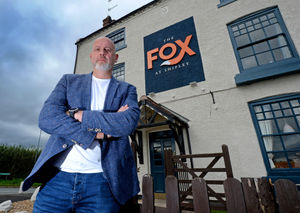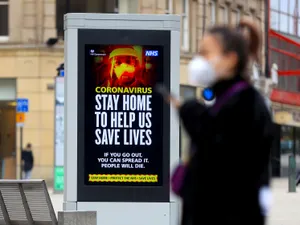Rishi walks the tightrope as he seeks to lead Britain out of lockdown
Restart grants for businesses forced to close during the pandemic. Management and IT support for small businesses, an extension to the furlough scheme, but eventual increases in corporation tax, and a freezing of income tax allowances.

When Rishi Sunak delivered his second Budget to the House of Commons yesterday afternoon, he surprised no-one.
It is fair to say things are very different from the days when the Budget was one of the great set pieces of political theatre, when photographers would clamour for pictures of the Chancellor walking in the park before the big announcement, and all eyes were on which tipple the main man would consume while revealing the contents of his battered briefcase.
Compared to the budgets of the past, yesterday's delivery was a bit of an anti-climax. For a start, as a teetotaller, there was never going to be much interest in what the Chancellor chose to drink while he was making his speech. Secondly, while the likes of Gladstone would talk for three or four hours, the Mr Sunak's statement was over in just 52 minutes. And the reason why there were few surprises is that most of it had already been briefed to the media over the previous days.
Certainly, times have changed since Hugh Dalton resigned in disgrace the day after delivering his 1947 Budget, having leaked details to a friend in the Press. Prime Minister Clement Attlee described Dalton as a "perfect ass" for his indiscretion.
Mr Sunak has certainly had an eventful first year in the job, since being promoted in the wake of Sajid Javid's shock resignation in February last year. Within four weeks of arriving in Downing Street, the Chancellor's first Budget on March 11 last year saw him announce £30 billion of extra spending, £12 billion to mitigate against the economic impact of the coronavirus pandemic. But six days later this was dwarfed by a £330 billion emergency support package for businesses affected by the lockdown, including the "furlough" scheme for employees who had been laid off. Throw in the 'Eat Out to Help Out' scheme in the summer, and it amounts to one of the biggest stimulus packages ever announced by a British government.
But if drawing up an emergency package to help businesses survive the pandemic was a tough introduction for the young Chancellor, the challenge he faces now could be even more problematic: he has to find a way of helping businesses to get back to normal, while also looking for a way of repairing the nation's finances after a period of unprecedented borrowing. All this to a backdrop that has seen unemployment rise to 1.7 million, with analysts warning that the worst is yet to come.
Mr Sunak hopes that his £5 billion 'restart grant' programme will go some way to helping with the first of these challenges, offering grants of up to £18,000 to businesses forced to close during the lockdown. He hopes that, combined with an extension to the furlough scheme, this will get the beleaguered hospitality and leisure industries up and running again. Smaller grants will also be available to shops that were ordered to close during the lockdown.
Neil Taylor, landlord of The Fox at Shipley, between Bridgnorth and Wolverhampton, says while any grant is welcome, it is a drop in the ocean compared to the losses he has endured over the past year.
"When the lockdown started in March last year, the grants were only available to people whose rateable value was up to £51,000, so we didn't get a penny," he says. "It is obviously an improvement in that respect.
"But £18,000 is about half our rates bill. It's better than nothing, but we had to take out a £95,000 rates interruption loan, so it's not going to make much of a dent in that.
"We know everybody's in the same boat, but when you've been running a business for 14 years, it's a kick in the teeth. We feel like we are going back to when we started.
"Also, when we took out the business interruption loan in March, April last year, we did our cashflow forecast expecting to be reopening in a couple of months' time. It's been a really tough time."
Mr Taylor says for him the most important things are that the VAT rate on food will be pegged at five per cent until September, and that the rates holiday will be extended, although only until the end of June – after that, businesses will be expected to pay a third of their rates until the end of the year.
Mr Sunak hopes his gradual increases in corporation tax over the next parliament – rising from the present 19 per cent to 25 per cent for larger firms – coupled with the extra revenue from freezing income tax allowances – will begin to chip away £407 billion cost of getting through the Covid crisis.
Mr Taylor wonders about the longer-term impact on his business.
"At the moment, it's tempting to say corporation tax doesn't really matter as we've been making massive losses, so we won't be paying any corporation tax," he says. "But when we are back on our feet, it's another kick in the teeth.
"If you put up income tax, it affects Joe Public's disposable income, meaning they can't come out and spend money, although over the past 12 months a lot of people have been able to save money."
Mr Taylor accepts that ultimately taxes will have to rise to cover the cost of the pandemic, but says businesses also need time to recover.
"I understand the amount they have had to spend over the past 12 months has got to come back from somewhere, but when they are spending billions on HS2 it does make you wonder where some of this money is coming from."
Nick Ralls, chief executive of Ironbridge Gorge Museums Trust, welcomes the Chancellor's £408 million support package for the arts sector.
"It's been a tough and worrying 12 months for everyone and as we tentatively emerge from the lockdown restrictions, it will be more important than ever to ensure people can access museums and art galleries as we begin to reconnect again as a society.
"The benefits they can bring after such an intense period of social isolation are immense, and while there's been lots of talk about the financial recovery plans needed in the UK, I believe our sector has an important part to play in the emotional recovery of the nation."
Andrew Huxley, managing director of West Midland building firm Besblock, welcomes the extension to the stamp-duty holiday and support for home buyers.
"The Government is doing everything it can to support everyone through this crisis but the extension of the stamp duty holiday, and the tapering of support through to October will do wonders for the construction sector," he says.
"Housing sales had fallen off in recent weeks with the scheme set to end but now we could well enjoy a boomtime through the summer and beyond which will do everyone's confidence the world of good."




